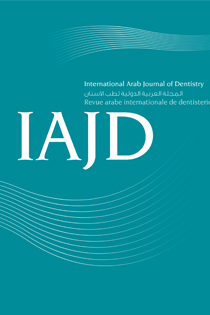Abstract
The purpose of the present study was to compare the ability of three restorative materials (mineral trioxide aggregate (MTA) – composite - glass ionomer cement (GIC)) in coronal sealing of the endodontically treated root canal intra-orifice in extracted teeth.
90 freshly extracted human teeth with single root canal were chosen. X-rays were taken, and the teeth were decoronated using a diamond disc. The canals were prepared and filled with zinc oxide-eugenol sealer and gutta-percha cones using the late- ral compaction technique. They were left for 24 hours in order to ensure the quite hardening of the filling material. After that, the filling material was removed vertically using a hot plugger up to a depth of 1 or 2mm inside the root canal, dividing by that the teeth into two main groups of 45 teeth each according to the depth of the intra-orifice. Each group was further divided into three sub-groups of 15 teeth each. The intra-orifice of all the teeth was filled with one of the restorative materials. The teeth were coated with varnish except for 1mm around the root canal intra-orifice. Then, they were immersed in methylene blue dye of 2% for five minutes. After that, the teeth were washed under a stream of copious water and left to dry. Longitudinal sections were made in the bucco-lingual direction. The sections were examined under an optical magnifier to measure the linear dye leakage using a millimeter ruler designed by “Autocad 2013” program.
Statistical analyses were conducted after collecting the data with p-value <0.05.
MTA material was significantly the best in coronal sealing. However, there were significant differences between MTA and composite and between GIC and composite at the depth of 1mm, but no such differences were found at 2mm depth.
MTA and GIC offered a higher sealing ability at a depth of 1 and 2 mm, while composite showed the least sealing ability among the materials.

